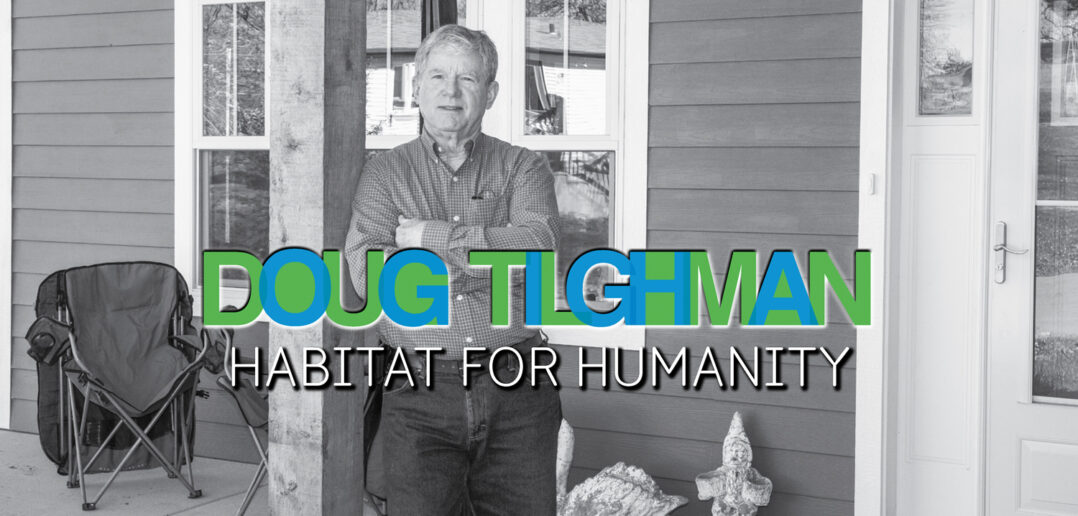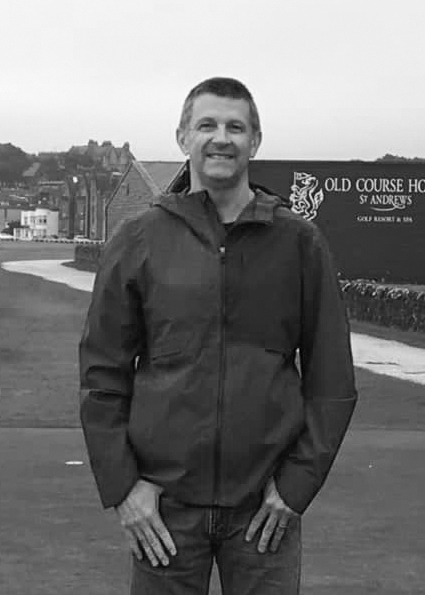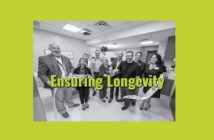| story by | |
| photo by | Steven Hertzog |
| OPEN A PDF OF THE ARTICLE |
Some options for volunteering, such as with Habitat for Humanity, offer those who prefer to use their hands and get physical the opportunity.

Habitat for Humanity: Doug Tilghman
The way Doug Tilghman sees it, he worked alongside volunteers and was closely involved with volunteering long before he officially became one. A native of Topeka but a Lawrence resident since 1968, Tilghman worked with volunteers in his job as assistant director of the Spencer Museum of Art. As the executive director for the East Central Kansas Economic Opportunity Corp. (ECKAN), a social services organization in Ottawa that covered six counties, he worked with volunteers. And at various times during that period, he volunteered himself at different civic organizations.
 This is something that brings together people who have everything they need and those who don’t have so many things we take for granted. We come to know the homeowner and love the homeowner and their family. It makes you aware and care about the people and hope they have good lives and good homes. It has made me a better person.
This is something that brings together people who have everything they need and those who don’t have so many things we take for granted. We come to know the homeowner and love the homeowner and their family. It makes you aware and care about the people and hope they have good lives and good homes. It has made me a better person. 
–Rosalynn Carter
So when it came time to retire in 2015, becoming a volunteer came naturally.
“After you retire … you have to find a way to stay busy,” Tilghman says.
Initially, he served as a volunteer flying rescue dogs for an organization called Pilots N Paws. But eventually, he found his volunteer sweet spot with the Lawrence chapter of Habitat for Humanity and has helped build that organization’s last seven homes.
“I’m not sure why (I chose) Habitat for Humanity,” he says. “I was looking for something that would give me a feeling of accomplishment, and I thought building houses would do that.”
Tilghman says he started with the organization building its 99th home and just recently completed house No. 106. He says he and fellow volunteers do all the framing, roofing, siding, painting and trim on the outside. Inside, they hang drywall, paint, install tile, trim and flooring—anything that doesn’t require a license.
“I’ve learned a lot by doing all this,” he says. “We have a core team of 10 to 12 people who continue to show up that just enjoy doing this several days a week.”
Tilghman says his work schedule typically runs 9 a.m. to 3 p.m. Tuesdays, Thursdays and Saturdays. For the most recent house, No. 106, built in Eudora, he served as construction manager and has also used his financial background to aid the organization in working within budgets.
“Doug has so many amazing skills,” says Erika Zimmerman, executive director for the Lawrence chapter of Habitat for Humanity. “He’s served us in many ways. He’s the chair of our finance committee, the treasurer of our Board. He helps with project management.
LOCAL MATTERS
Our Local Advertisers – Making a Positive Impact
“He helped us when we were at a standstill in construction,” she continues. “He stepped up and helped get a project finished. He just kept saying ‘yes’ every day and was able to overcome every barrier. He’s just very versatile, thoughtful and willing to do what’s needed to get a job done. And his fellow volunteers respect him enough to follow his direction.”
Tilghman says he always has a favorite day during the process of building a home as a volunteer for the Lawrence affiliate of Habitat for Humanity. On the final day of construction, when a house is finished, the Habitat crew always holds a dedication ceremony, where the family for whom the home was built gets to stand in front of the volunteers and speak about what having a stable, permanent home means to them.
Many of those awaiting a Habitat for Humanity-built home haven’t enjoyed the security of a permanent home in years, if ever. This moment in the building process, Tilghman says, is the moment volunteers see in real time and face-to-face the difference they’ve made in changing lives and helping fellow citizens.
“That’s when you can see the results in our efforts, not just in the house but in the faces of the people you’ve impacted,” he says.
“The owner of the last house said they’d moved eight times in the last five years,” Tilghman continues. “Each time, the son has wanted to paint the wall of his bedroom. He knows now that this will be his bedroom. That feeling of having a permanent home … she talked about that. It’s theirs to do whatever they want with it.
“That’s a huge change,” he adds.
Now 74, Tilghman says he plans on continuing his work with Habitat for Humanity as long as he’s physically able. The work is great exercise, he says, and the self-fulfillment he gains is more than he ever felt as a salaried employee.
“It’s better in a lot of ways,” he continues. “You choose to do it because it makes you feel better. Each house is a little different; you can get creative.
“It’s more fulfilling to do something because you choose to and want to instead of doing something for a paycheck,” Tilghman says.
![]()





